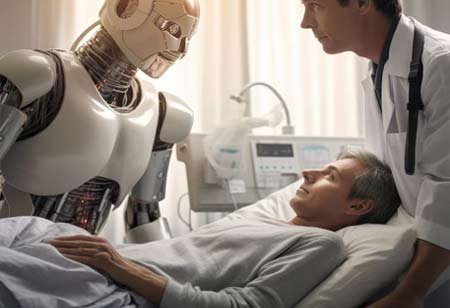

Thank you for Subscribing to Eldercare Review Weekly Brief

Bond’s journey began with a passion for patient care. Trained at Thomas Jefferson University and UC Davis, Bond brings a decade of experience as an emergency physician at OSF HealthCare. Along the same timeline, he directs the Clinical Decision Unit and quality initiatives at St. Francis Medical Center. Also, as a professor and research lead at Jump Simulation, he advances safer, smarter, and more equitable care through innovation.
 Simulation Leadership Built to Heal
Simulation Leadership Built to Heal
William Bond has spent more than a decade shaping how emergency medicine is delivered and how future physicians are trained. His work centers on improving how care is delivered in real time—enhancing safety, streamlining flow and making decisions that balance urgency with thoughtfulness. In overseeing the Clinical Decision Unit, he supports a space designed for close observation and deeper diagnosis, where time and attention can make all the difference in a patient’s outcome.
At the intersection of research and real-world application, Bond leads as Director of Simulation Research at Jump Simulation, a partnership between OSF HealthCare and the University of Illinois College of Medicine at Peoria. Here, he helps teams push the boundaries of how healthcare can learn from itself—using simulation to test ideas, refine skills and introduce innovations. His work with natural language processing has created new ways to provide feedback during medical training, helping learners grow with precision and purpose. Whether assisting rural hospitals in implementing telemedicine for sepsis care or building programs that train facilitators to have difficult but necessary conversations about end-of-life care, Bond’s projects are design-driven and rooted in empathy.
A Career Shaped by Innovation and Intention
The journey began at Thomas Jefferson University and continued with his residency in Emergency Medicine at UC Davis. Since earning his board certification in 1999, he’s embraced roles that span clinical care, research and education. His current projects range from a National Science Foundation-backed initiative to ensure fairness in breast cancer risk prediction to improving maternal safety through smarter alarm design to modeling emergency department workflows through simulation. Each project brings together his deep knowledge of systems with a clear-eyed understanding of the human moments that define healthcare.
PBond helps teams push the boundaries of how healthcare can learn from itself—using simulation to test ideas, refine skills and introduce innovations
Bond’s early work in simulation helped lay the foundation for exploring how teams respond to pressure, how communication shapes outcomes and how learning can be woven into daily practice. His published work on cognitive error and diagnostic reasoning reveals a continued focus on how doctors think, not just what they do. Through each chapter of his career, he has looked for ways to make learning continuous, thoughtful and more responsive.
Leadership Rooted in Insight and Integrity
Known for leading calmly and listening intently. Whether mentoring residents, guiding researchers, or collaborating with frontline teams, he brings a grounded, patient-first approach. He doesn’t just design programs. He builds trust and invites collaboration. His ability to move between clinical care and complex research allows him to see the big picture without losing sight of the details that matter most. Colleagues often describe him as steady and curious, with a deep respect for both the science of medicine and the humanity at its core.
Designing the Future of Emergency Medicine
Over the past decade, Bond has helped build a culture where quality, education and innovation meet. He understands that lasting change in healthcare happens not through sweeping statements, but through consistent, thoughtful action. Whether helping physicians navigate uncertainty or developing tools that make care more equitable and effective, his work reminds us that great systems start with great questions—and a willingness to keep learning. For Bond, simulation is more than a method—it’s a way of thinking. And emergency medicine is more than a moment of care—it’s a chance to reimagine how healing happens.
I agree We use cookies on this website to enhance your user experience. By clicking any link on this page you are giving your consent for us to set cookies. More info